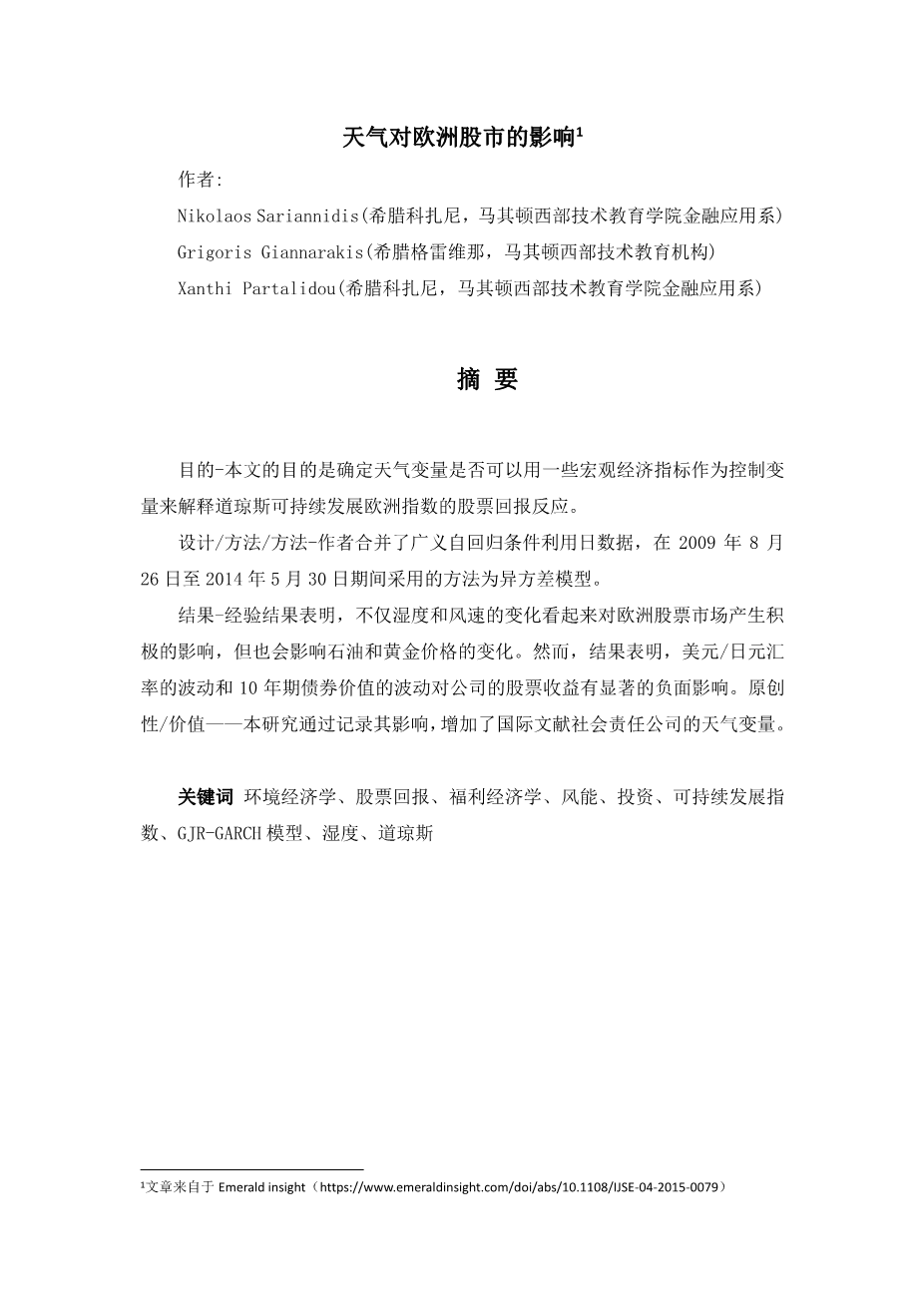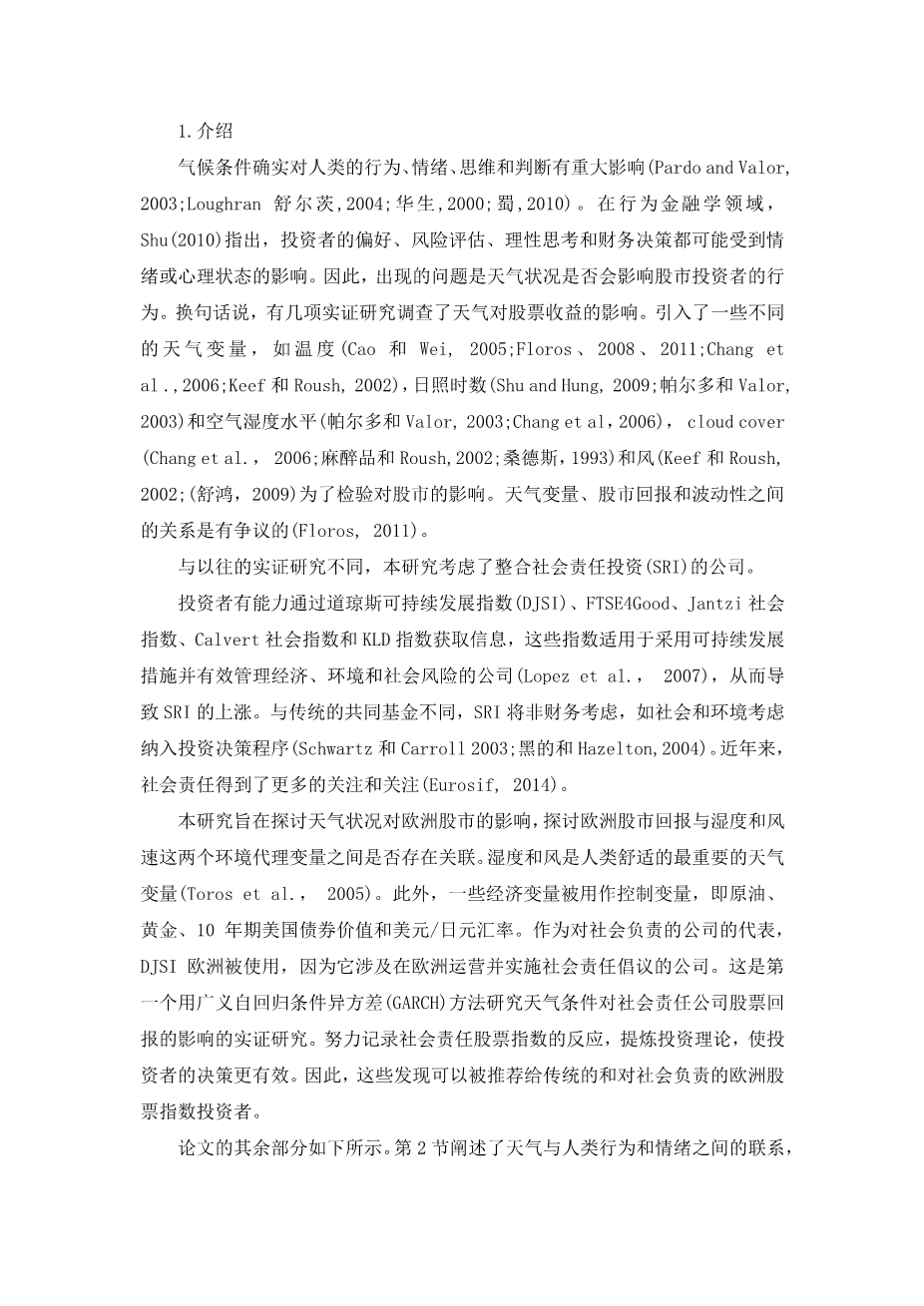The effect of weather on the European stock market[1]
Author(s):
Nikolaos Sariannidis, (Department of Financial Applications, Technological Education Institute of Western Macedonia, Kozani, Greece)
Grigoris Giannarakis, (Department of Business Administration, Technological Educational Institution of Western Macedonia, Grevena, Greece)
Xanthi Partalidou, (Department of Financial Applications, Technological Education Institute of Western Macedonia, Kozani, Greece)
Abstract
Purpose – The purpose of this paper is to ascertain whether weather variables can explain the stock return reaction on the Dow Jones Sustainability Europe Index by employing a number of macroeconomic indicators as control variables.
Design/methodology/approach – The authors incorporate the generalized autogressive conditional heteroskeasticity model in methodology for the period August 26, 2009 to May 30, 2014 using daily data.
Findings – The empirical results indicate that not only do changes in humidity and wind levels seem to affect positively the European stock market but changes in returns oil and gold prices as well. However, the results show that the volatility of the US dollar/Yen exchange rate and ten-year bond value exerts significant negative impact on companies’ stock returns.
Originality/value – This study adds to the international literature by documenting the impact of weather variables on socially responsible companies.
Keywords Environmental economics, Stock returns, Welfare economics, Wind, Investment, Sustainability Index, GJR-GARCH model, Humidity, Dow Jones
1. Introduction
It is true that weather conditions have a significant impact on human behavior, mood, thinking and judgment (Pardo and Valor, 2003; Loughran and Schultz, 2004; Watson, 2000; Shu, 2010). In the field of behavioral finance, Shu (2010) pointed out that investors’ preferences, risk assessments, rational cogitations and financial decisions can be affected by their mood or psychological state. Thus, the question that arises is whether weather conditions can affect the behavior of stock market investors. In other words, there are several empirical studies that investigate the role of weather effect on stock returns. A number of different weather variables have been introduced, such as temperature (Cao and Wei, 2005; Floros, 2008, 2011; Chang et al., 2006; Keef and Roush, 2002), number of sunshine hours (Shu and Hung, 2009; Pardo and Valor, 2003) and air humidity levels (Pardo and Valor, 2003; Chang et al., 2006), cloud cover (Chang et al., 2006; Keef and Roush,2002; Saunders, 1993) and wind (Keef and Roush, 2002; Shu and Hung, 2009) in order to examine the impact on the stock market. The relationship between weather variables, stock market returns and volatility is controversial (Floros, 2011).
Unlike prior empirical studies, this study takes into consideration companies that integrate socially responsible investments (SRI).
Investors have the capability to acquire information via Dow Jones Sustainability Index (DJSI), FTSE4Good, Jantzi Social Index, Calvert Social Index and KLD indexes for firms that employ sustainability initiatives and manage effectively economic, environmental and social risks (López et al., 2007) leading to a rise in SRI. Unlike the conventional mutual funds, SRI integrates non-financial considerations, such as social and environmental ones into the investment decision procedure (Schwartz and Carroll 2003; Haigh and Hazelton, 2004). SRI receives greater attention and awareness over the last years (Eurosif, 2014).
The present study intends to examine the impact of weather conditions on European stock market by exploring whether there is a relationship between the European stock returns and two environmental proxy variables, namely, humidity and wind levels. Humidity and wind are among the most significant weather variables of human comfort (Toros et al., 2005). Also, a number of economic variables are used as control variables, namely, crude oil, gold, ten-year US bond value and the US dollar/Yen exchange rate. As a proxy for socially responsible companies the DJSI Europe is used as it concerns companies that operate in Europe and implement socially responsible initiatives. This is the first empirical study that investigates the impact of weather conditions on stock returns of socially responsible companies using generalized autogressive conditional heteroskeasticity (GARCH) methodology. An effort is made to record the reaction of socially responsible stock indices refining investment theories and making the investors’ decision more effective. Thus, the findings can be recommended to both conventional and socially responsible investors dealing with European stock indices.
The remainder of the paper is organized as follows. Section 2 illustrates the linkage between weather and human behavior and mood along with the effects of environmental variables on stock returns focussing on humidity and wind variables. Section 3 describes the data along with the methodological steps that are incorporated in the study, while Section 4 reports the results of the analysis. In the last part, Section 5, the conclusion is presented.
2. Literature review
In the field of behavioral finance, there is a systematic approach to investigate the fact whether weather conditions can affect the investors’ psychology or not. In the first part, the weather impact on human behavior and mood is recorded, while in the second part weather variables that affect the stock returns focussed on humidity and wind speed variables are presented.
2.1Weather effect on human behavior and mood
In general, changes in weather condition can lead to complex psychological and physical responses and they are responsible for different human behavioral aspects,
剩余内容已隐藏,支付完成后下载完整资料


英语译文共 10 页,剩余内容已隐藏,支付完成后下载完整资料
资料编号:[469903],资料为PDF文档或Word文档,PDF文档可免费转换为Word
以上是毕业论文外文翻译,课题毕业论文、任务书、文献综述、开题报告、程序设计、图纸设计等资料可联系客服协助查找。


